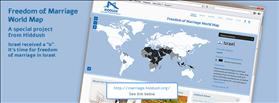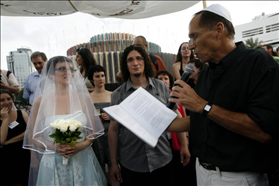Putting freedom of marriage "on the map"
On Hiddush's Freedom of Marriage World Map, Israel receives "0" for religious monopoly and severe restrictions on marriage.
45 countries, including Israel, received a grade of "0" due to severe restrictions on freedom of marriage. Hiddush CEO Rabbi Uri Regev: We cannot miss this historic opportunity for freedom of marriage in Israel.
29/04/2013 14:10
Tags: Freedom of marriage · freedom of marriage world map · Rabbi Uri Regev · Stanley Gold · civil marriage · Rabbinate

Freedom of Marriage World Map Timeline Graphic
Hiddush - Freedom of Religion for Israel released a comparative online world map that examines the status of freedom of marriage around the world.
View the Map
Main Findings - The Situation in Israel - Information about the Map
The research includes almost every independent UN-member country and several additional entities (194 in total). The countries are graded on a scale of 0-2, based on the degree to which freedom of marriage is guaranteed to the given country's citizens. The study shows that freedom of marriage prevails in 93 (48%) of the world's countries. There are partial restrictions on marriage in 56 (29%) countries and in 45 (23%), including Israel, there are severe restrictions on freedom of marriage. 33 of the 45 countries that received the grade "0" (severe restrictions) are Islamic countries.
Israel received the grade of "0" because of its legislated religious monopoly on marriage, which denies hundreds of thousands of citizens the right to marry altogether. Millions more are denied the ability to marry in a ceremony of their choice. Israel is the only Western democracy in the world that received the lowest grade. Its restrictions on marriage places Israel, in this regard, alongside its neighboring Muslim countries: Iran, Pakistan, Afghanistan, Saudi Arabia and the rest of the fundamentalist Islamic states.
Hiddush Chair, Stanley P. Gold, emphasized: “Our hope is that the difficult image this map has created will assist in promoting a policy change in Israel that will bring forth freedom of marriage. It is universally recognized as a major human and civil right and should be a natural implementation of Israel's own Declaration of Independence, which promises freedom of religion and conscience."
Hiddush CEO, Rabbi Uri Regev, explained that, "the original goal of the map was to demonstrate that when it comes to freedom of marriage, Israel's unfortunate standing is alongside Islamic states. This is in contrast to acceptable standards in the Democratic world and the desire of a clear majority of Israel’s population. To our surprise there was no comparative list in existence that examined freedom of marriage throughout the world. As a result, Hiddush's staff conducted extensive research and produced a project that is the first-of-its kind, and hopefully will not only benefit Israelis but also other groups that are working to promote freedom of marriage around the world.” Rabbi Regev also stressed that "a clear majority of the Israeli public supports this move and the last Knesset elections created a historic opportunity to break the Orthodox control over marriage and divorce. We must not miss out on this opportunity."
The map's research was headed by Natasha Roth. The map was produced by Hiddush Spokesman, Miki Sokolovsky and edited by Hiddush Vice President for Reseach and Information, Shahar Ilan. The site and map was designed and built by Lionways Inc with assistance from the New Israel Fund.
Main Findings
Severe restrictions among two-thirds of Islamic countries Almost half of the world's countries (93 countries- 48%) guarantee freedom of marriage, or almost full freedom of marriage (Grade 2) for their citizens. In general, stable democracies provide their citizens with a wide variety of options for marriage. Almost every country in Europe and around 75% of the countries in Africa allow freedom of marriage or close to full freedom of marriage. For 82 of the 93 countries that allow freedom of marriage (88%), Christianity is the principle religion. 56 countries (29% of the world's countries) received the grade of "1" which denotes partial restrictions on freedom of marriage.
A clear majority of the Israeli public supports this move and the last Knesset elections created a historic opportunity to break the Orthodox control over marriage and divorce. We must not miss out on this opportunity.
There are 45 countries, which constitute one-quarter of the world's countries that received a grade of "0." This indicates severe restrictions on freedom of marriage. The principle religion in 33 of those countries (73%) is Islam.Christianity is the principle religion in only eight of those countries. Israel received a "0" alongside its neighbors: Egypt, Jordan, Syria, Lebanon, and the Palestinian Authority. North Korea, an officially Atheist country in which inter-class marriage is forbidden, also received a "0."
In 120 countries, close to two thirds of the world's countries, the dominant religion is Christianity. Among them, two-thirds (82 countries) exercise freedom of marriage and only eight of them had severe restrictions on marriage which caused them to receive a "0." In 53 countries the dominant religion is Islam. Only three of them (6%) allow freedom of marriage. In 33 of those countries, which are close to two-thirds of all Islamic states, there are severe restrictions on freedom of marriage (Grade 0).
The map shows a clear geographic picture of a wide core of countries that severely restrict freedom of marriage. North, East, and Central Africa, the Middle East, and Western and Central Asia create a large black area in the center of the map. This core is surrounded from the east (Asia) and the south (South and West Africa) by a large number of countries in which there are partial restrictions on freedom of marriage. They create the two large grey areas on the map.
In the north, west, and southeast regions of the globe (the four continents colored in white: the Americas, Europe, and Oceania), there is almost full freedom of marriage. Europe gives the clearest picture: 44 out of the 46 countries provide their citizens with freedom of marriage. In one country (Albania) there are restrictions on freedom of marriage. In the Vatican, there are severe restrictions on freedom of marriage. The table also takes note of countries that have legalized same-sex marriage or civil unions for same-sex couples. Due to the fact that there are not enough countries that recognize same-sex marriage, this factor did not influence the country's grade.
The Situation in Israel
Hundreds of thousands of citizens cannot get married Israel received the grade of "0" due to severe restrictions that deny legal marriage and discriminate against wide populations:
• Israeli law only recognizes religious wedding ceremonies, conducted by state-recognized religious functionaries. With regard to weddings conducted in Israel, there is no option for civil marriage.
• Among the Jewish population, the (Orthodox) Chief Rabbinate has sole legal authority over marriage.
• Only those who are recognized as Jews according to Orthodox Jewish law can get married in Israel. They are only allowed to marry other Jews approved by the Chief Rabbinate. The marriage ceremony is strictly Orthodox and non-egalitarian. Members of other religions can only marry spouses of the same religion and only by their own State-recognized religious authorities.
• Over 300,000 Israeli citizens do not have an official religious status, meaning that 4% of the population is unable to legally get married (These are mostly new immigrants for the Former Soviet Union, who have paternal Jewish ancestry, but whose mothers are not Jewish).
• There are a significant number of Israeli citizens who are Jewish according to Orthodox standards, but cannot marry because of restrictions arising from Orthodox Jewish law. For example, a descendant of the ancient priesthood tribe, regardless of his religious belief, cannot marry a divorcee or a female convert to Judaism. Neither can people who have been declared “illegitimate” in the eyes of religious law.
• Converts that joined Judaism through a non-Orthodox conversion (Reform, Conservative, Reconstructionist, Renewal) and sometimes even Jews who converted through a moderate Orthodox rabbi, cannot get married in Israel.
• The Orthodox monopoly over Jewish citizens (and respectively – the same is true for non-Jewish citizens in Israel) also denies millions more the right to marry according to their belief, which is mostly Secular and non-Orthodox. This is partly due to the non-egalitarian characteristics of the Orthodox ceremony.

Russian immigrants marry an informal marriage ceremony on Valentine's Dayon Dizengoff Square. The bride is not recognized in Israel as a Jew, so the couple can not marry in Israel officially. 04.08.2009. Photography: Miriam Alster, Flash 90
According to Israel's Central Bureau of Statistics (CBS) data, in 2010, 9,262 Israeli couples reported to the Ministry of the Interior that they married abroad in contrast to the 47,855 couples that were married in Israel (under Orthodox auspices) in the same year. This means that 16% of the marriages of Israelis were held abroad. Similarly, the CBS reported that over the course of the last 10 years, the number of Israeli Jewish couples that chose to cohabit without marriage rose by approximately 250%. This is clearly attributed to a growing number of Israelis who refuse to marry in the Orthodox ritual, and couples who fear that if their marriage would not succeed they would be under the jurisdiction of the Orthodox rabbinate for the dissolution of the marriage.
Information about the Map
The research included almost every independent UN-member country and several additional entities. The following rating system was used:
0- Severe restrictions on freedom of marriage;
1- Partial restrictions on freedom of marriage, meaning: significant discrimination in certain areas or a number of minor restrictions;
2- Complete or almost complete freedom of marriage.
Alongside the map, there is a user-friendly table that contains information about each country. The map contains around 160 countries and the table 194 countries. Grades "1" and "0" were given to countries that restrict freedom of marriage in legislation; often where the marriage laws are determined by Islamic Sharia law. The lower grades can also be given in a country where formal freedom of marriage exists but is not respected in practice. These types of countries often have reports of marriage laws that discriminate against women, underage marriage, forced marriage, and polygamy.
A wide variety of sources were examined in order to reach a consistent and fair evaluation of the status of freedom of marriage around the world. Two of the main sources for the project consisted of yearly reports of the United States Department of State: The Freedom of Religion Report and the Human Rights Report for each country. Other sites that were consulted for the project were the Gender Index, The European Council, and information provided by the World Bank.